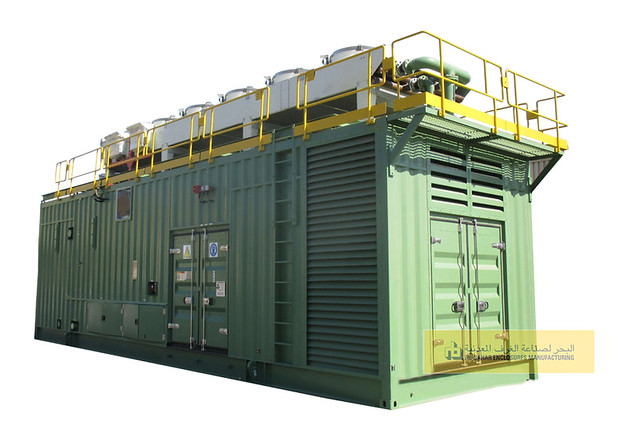In the offshore oil and gas, maritime, and construction industries, effective transportation, storage, and handling of equipment and materials are crucial to maintaining operational efficiency and safety. Offshore containers play a pivotal role in achieving this goal. These specialized containers are designed to withstand the extreme conditions of the offshore environment, ensuring that equipment and supplies are transported and stored safely, even in the most challenging conditions.
Offshore containers, also known as offshore cargo containers, are standardised, durable units that adhere to specific safety regulations and are used to transport goods to offshore platforms, rigs, vessels, and other maritime installations. These containers are essential for streamlining logistics, maintaining inventory control, and minimizing downtime on offshore sites. In this blog, we will explore the key benefits, features, and uses of offshore containers and how they contribute to smoother operations in the offshore industry.
What Are Offshore Containers?
Offshore containers are specially designed for the transportation and storage of materials in harsh offshore environments. They are built to endure the intense forces of sea winds, corrosive saltwater, and fluctuating temperatures. Offshore containers are typically constructed from high-strength steel or other robust materials that can withstand extreme weather conditions, including storms and heavy seas.
The containers are equipped with lifting points and certified for offshore use to ensure safe handling during transportation and lifting operations. They also meet specific international standards, including the International Maritime Organization (IMO) and DNV (Det Norske Veritas) certification, ensuring that they are fit for purpose and capable of maintaining cargo integrity during transit.
Key Features and Benefits of Offshore Containers
Durability and Robustness
Offshore containers are designed to withstand the harsh conditions of offshore environments, including exposure to saltwater, high humidity, and extreme weather. The use of corrosion-resistant materials, such as galvanized steel or special coatings, ensures that the containers can endure prolonged exposure to these elements without suffering significant degradation.
Safety and Compliance
Safety is paramount in offshore operations, where mishandling of cargo or faulty containers can lead to accidents, injuries, or equipment damage. Offshore containers are rigorously tested to ensure they meet stringent safety standards. They are designed to prevent spillage, minimize the risk of container failure during lifting, and facilitate secure storage and transportation.
Standardized Design
One of the major advantages of offshore containers is their standardized design. This allows them to be easily handled and transported by cranes and other lifting equipment on offshore platforms and vessels. The uniform size and design also make it easier to stack containers efficiently, saving valuable space on rigs and vessels and reducing clutter in storage areas.
Versatility
Offshore containers come in a wide variety of shapes, sizes, and configurations to meet different needs. From standard open-top and closed containers to specialized units for hazardous materials (IMDG containers), tool storage, and refrigerated cargo (reefers), the versatility of offshore containers makes them essential for a wide range of offshore applications. Whether transporting tools, machinery, chemicals, or perishable goods, there is likely an offshore container that fits the specific requirements of the job.
Protection Against Contamination
In offshore industries, the risk of contamination is high due to the nature of the materials being transported (e.g., chemicals, oils, and fuel). Offshore containers are designed with tight seals and secure locking mechanisms to protect the contents from contamination, theft, and adverse environmental conditions. For highly sensitive or hazardous materials, the use of specialized containers, such as hazardous cargo containers, ensures that safety regulations are met and that spills or leaks are prevented.
Applications of Offshore Containers
Transportation of Equipment and Supplies
Offshore containers are most commonly used to transport equipment, tools, machinery, and supplies between offshore platforms, rigs, vessels, and shore-based facilities. These containers facilitate the efficient movement of goods in and out of offshore environments, reducing transportation costs and logistical complexities.
Storage of Materials
In addition to transportation, offshore containers are used for on-site storage of materials, tools, and equipment. Offshore platforms, which often operate in remote and challenging locations, require secure, weatherproof storage solutions. Containers provide a convenient and efficient means of storing materials safely and in an organized manner, reducing the risk of damage, theft, or exposure to the elements.
Waste Management
Waste management is a critical component of offshore operations, especially when dealing with hazardous materials or large quantities of waste generated during drilling, construction, or maintenance activities. Offshore containers designed for waste management help offshore facilities comply with environmental regulations and safely store waste until it can be properly disposed of or transported back to shore for recycling or disposal.
Accommodation and Office Units
Offshore containers are not limited to cargo transportation; they can also be converted into accommodation units, office spaces, and workshops. Modified offshore containers provide a cost-effective and durable solution for creating temporary housing and office spaces on offshore rigs and platforms. These converted containers can be outfitted with necessary utilities, including ventilation, electricity, and plumbing, offering a safe and comfortable environment for offshore personnel.
Conclusion: The Essential Role of Offshore Containers in the Industry
Offshore containers are indispensable assets in the offshore industry, playing a crucial role in ensuring the safe, efficient, and compliant transportation, storage, and handling of goods. Their durability, safety features, and versatile design make them an ideal solution for managing the complex logistics of offshore operations. By utilizing offshore containers, businesses can reduce operational costs, improve safety, and maintain productivity in even the most challenging offshore environments.
As offshore industries continue to evolve, the role of offshore containers will only become more significant. Their ability to adapt to new challenges—whether it’s the transportation of more complex equipment, compliance with stricter regulations, or the need for more innovative storage solutions—makes them a cornerstone of efficient and sustainable offshore operations. Whether you’re managing an offshore oil rig, a shipping operation, or a maritime construction project, offshore containers are an essential part of ensuring smooth and safe operations.



